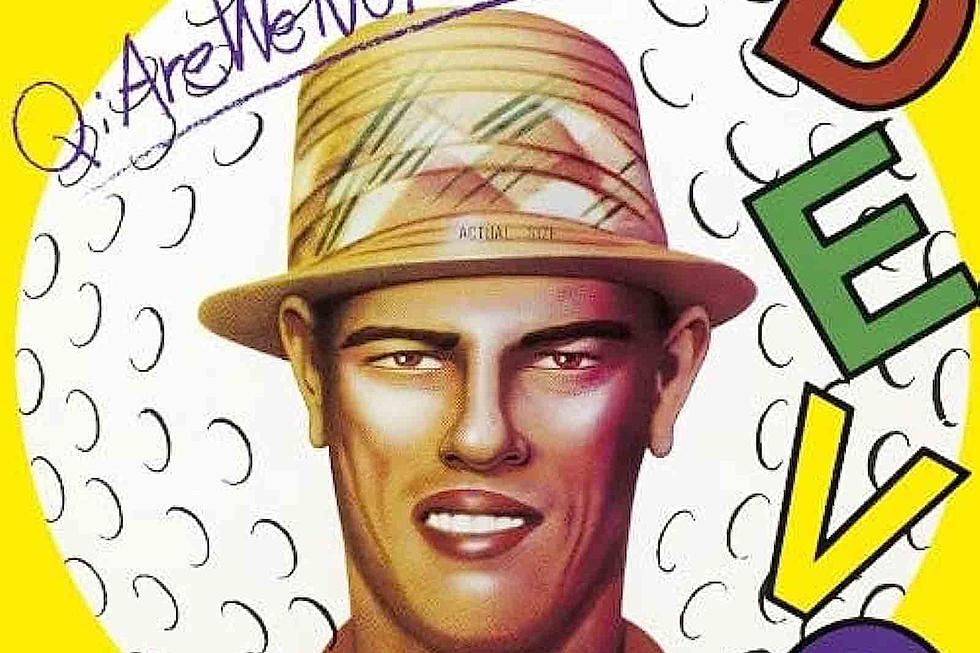
45 Years Ago: Devo Shakes Up the Mainstream With Debut Album
When Devo's debut album arrived in late August 1978, nothing else sounded quite like it. Even by the standards of the late '70s – the era of punk rock, new wave and futuristic-sounding electronic music – Q: Are We Not Men? A: We Are Devo! was an outlier, a record of new sounds and abrasively grating music that divided fans of all tastes.
Surprisingly, the band started putting together the songs for the album four years earlier, when the Akron-based quintet – Mark Mothersbaugh, Gerald Casale, Bob Mothersbaugh, Bob Casale and, eventually, Alan Myers, who joined in 1976 – wrote several of the numbers that became staples of their live shows. Even then they were onto something different.
"We decided to go beyond our genres on purpose," Gerald Casale told Billboard in 2007, noting that Mark Mothersbaugh had hair "down to his waist and ... was playing Emerson, Lake & Palmer songs in a cover band, and I was playing bass in a blues band. As we worked together, we decided to forge something that was neither of what we had been doing, and that became Devo music. And Devo music is Devo music."
A year earlier, in March 1977, Devo released their first single, "Mongoloid"/"Jocko Homo," on their independent label, Booji Boy Records. It wasn't long before the big companies expressed interest and equally big and familiar names from rock's outer edges – David Bowie, Brian Eno and Iggy Pop, especially – were proposed as producers for their debut album. By the end of the year, Eno had landed the job, and Warner Bros. signed the group.
Listen to Devo's 'Mongoloid'
The sessions, started in October 1977 before Devo signed to Warner Bros., took place in Cologne, Germany, and almost immediately the band and producer butted heads. In Simon Reynolds' Rip It Up and Start Again: Postpunk 1978–1984, the band said they "were overtly resistant to Eno's ideas. He made up synth parts and really cool sounds for almost every part of the album, but we used them on three or four songs."
Eventually, Bowie reentered the picture and remixed the songs that ended up on Q: Are We Not Men? A: We Are Devo! The result was one of the most divisive records of the era, and among the most influential albums ever made. Skirting the lines among punk, new wave, post-punk, art-rock and electronic music, songs like "Mongoloid," "Jocko Homo" and "Come Back Jonee" blended traditional rock elements like guitars and drums with synthesizers and keyboards that were often played in a rudimentary manner that gave the songs clunky, robotic pacing.
It was all part of Devo's plan. Dressed in yellow jumpsuits, performing in herky-jerky movements that complemented their robotic rhythms and espousing a "de-evolution" theory that grew from sociopolitical concerns of the period, including Vietnam and the Kent State University shootings (Mark Mothersbaugh and Gerald Casale were there when the Ohio National Guard opened fire on protestors, killing four students), they were as much performance artists as musical ones.
Watch Devo's '(I Can't Get No) Satisfaction' Video
And that's where Devo collided with traditional rock fans. They were strange and strange looking, overly arty, and their music was even weirder, sidestepping easily identifiable rhythms, lyrics and classic rock patterns. It didn't help that Devo introduced themselves to mainstream listeners with a cover of the Rolling Stones' "(I Can't Get No) Satisfaction" that's equal parts deconstruction and mockery.
The Stones' first U.S. No. 1 hit was just over a dozen years old when Devo covered it, and in that time "Satisfaction" had become one of rock 'n' roll's cornerstone songs, an indisputable classic that was both sacred and beyond reproach. The Rolling Stones were also enjoying a comeback in 1978, after a few years of creative bloat, with Some Girls, a chart-topping album that embraced the "new" sounds of disco, punk and new wave along with the usual guitar-based rock audiences knew and loved.
The backlash in some circles was immediate. Rock fans who had previously expressed their displeasure with punk and cried "disco sucks" now had a new enemy, one that dared to turn a classic song like "Satisfaction" into a mess of stutters, shorted wires and passionless vocals. Mick Jagger, however, approved, and a week after the Rolling Stones appeared on Saturday Night Live in October 1978, Devo made their national television debut on the same program.
It all gave Devo the inroad they needed to make an impression with listeners. Q: Are We Not Men? A: We Are Devo! peaked at No. 78 in the States and eventually went gold. Within two years their third album, Freedom of Choice, hit No. 22 – their highest charter – and included the Top 15 hit "Whip It." It seemed the mainstream finally caught up with Devo, or at least reluctantly accepted their skewed view of this world.


